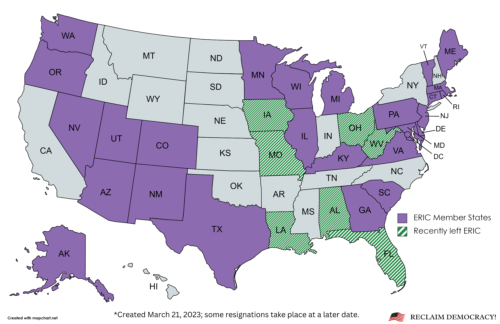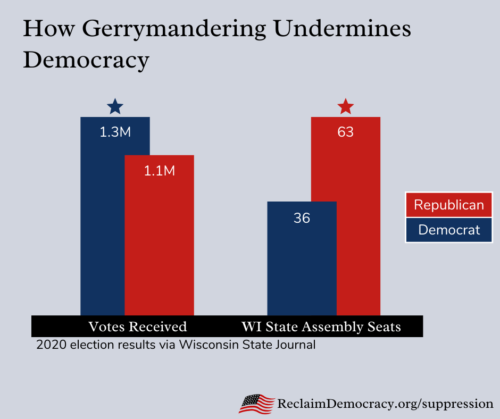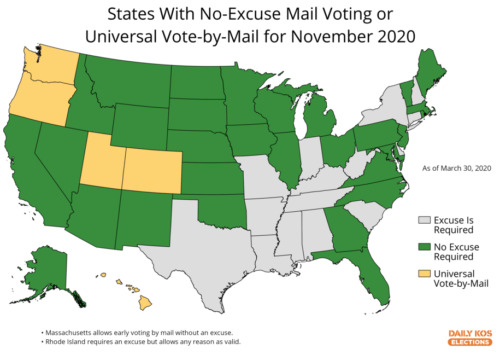Citizen lawmaking via state ballot initiatives is overwhelmingly popular with people across political spectra and has no inherent bias, but in the wake of citizens using initiatives to counter Republican extremism in recent years, GOP legislators have unleashed a wave of bills to obstruct the process. These tactics fall into three categories: keeping initiatives from reaching the ballot, impeding passage, and altering voters’ intent post-passage.
Every Western state in the Lower 48 except New Mexico enables citizens to make laws directly, a vital check on legislators who refuse to act on pressing issues. As a result, Montanans’ water is protected from cyanide leach mining, thousands of Idahoans can access needed health care via Medicaid expansion, and documented immigrants in Arizona gained in-state tuition rates at public colleges.
The surge in Republican attacks seems driven by alarm over pro-choice voters winning in all six states where abortion ballot questions appeared following the U.S. Supreme Court’s regressive majority overturning Roe v Wade in 2022, including GOP strongholds like Montana, Kansas, and Kentucky. In November of 2024, Arizona and Florida voters will likely vote on whether to overturn abortion bans imposed by legislators despite overwhelming support for bodily autonomy among residents (e.g. sixty-four percent of Floridians say abortion procedure should be legal in most or all cases). Up to nine states may have abortion on the ballot this fall.
But direct democracy has no partisan bias. Empowering voters sometimes favors conservative causes. In Colorado, for example, 65 percent of voters approved a 2022 initiative cutting state income taxes and passed another measure saying only U.S. citizens may vote in the state.
Looking beyond policy outcomes, suppressing ballot initiatives invites turmoil. The process serves as a safety valve, giving citizens a constructive option when legislatures defy constituents. This is especially valuable when ousting incumbents in “safe seats” is nearly impossible due to gerrymandered districts.
Much of the current GOP policy agenda is deeply unpopular, even among their voters, but rather than listening to constituents or moderating policies, stifling constituents has become the norm (in more ways than one). Montana Senate Bill 93, passed last year, would have forced citizen groups to pay a $3,700 filing fee just to start a petition drive (a Montana court struck down that portion of the law in early 2024) while giving state officials the power to reject a proposed initiative if they deemed it similar to any that failed within the previous four years.
After defeating an initiative to cap homeowner taxes in the previous election, powerful corporate lobbying groups like the Montana Chamber of Commerce and Association of Realtors backed the proposed barriers to direct democracy. Democratic State Representative Kelly Kortum calls the bill, “An attempt to strip Montanans of the ability to make laws themselves.”
In Idaho, the GOP introduced a resolution to amend the state constitution to accomplish voter suppression the state supreme court struck down just two years ago. It would require initiative backers to gather in-person signatures from six percent of voters in all of Idaho’s 35 districts–doubling the current 18-district requirement and requiring the assignment of signature gatherers to small towns nine hours from the state capital of Boise. Luke Mayville of Reclaim Idaho, the grassroots organization behind the 2018 initiative that expanded Medicaid coverage, says such restrictions “would render citizen initiatives impossible.”
While that bill appears dead for the current legislative session, several other states are pushing related tactics that impede signature-gathering and give outsized power to rural areas.
Even without an impossibly short window, extreme signature-dispersal schemes proposed in Idaho and other states would grant corporations the power to prevent voters from ever seeing a measure disfavored by big business. That threat exists thanks to the U.S. Supreme Court creating a First Amendment “right” for corporations to spend unlimited sums influencing ballot questions, in 1978 (First National Bank of Boston v Bellotti).
In Nevada, NV Energy spent $63 million to thwart an initiative that aimed to end its electric monopoly. With extreme signature-gathering requirements, corporations could prevent the public debate ballot questions provoke by coopting or propagandizing voters in a single district (to deter residents from endorsing an initiative). This would be easily accomplished in rural districts where gaining endorsements from six percent of voters already is burdensome.
Direct democracy in the West arose largely through citizens fighting the corruption of state legislatures by mining, railroad, and timber interests — especially in Montana). South Dakota led the way in 1898, followed rapidly by Oregon, Montana, and now 24 total states. So laws that would enable corporations to stifle citizen initiatives before they reach the ballot completely betray that original intent.
The merit of citizen lawmaking is one point of broad agreement among citizens of differing party loyalties and ideologies. This vital tool is under increasing attack, and it’s up to all of us to defend our right to self-governance from politicians who seek to elevate their power at the expense of their constituents.
Jeff Milchen is a board member of Reclaim Democracy!
Editor’s note: we’ve been warning of the escalating attacks on citizen lawmaking for years and are pleased to see have been opened as the sabotage attempts became more glaring in 2023. Our previous reporting has appeared in Jacobin and Governing, among others.





